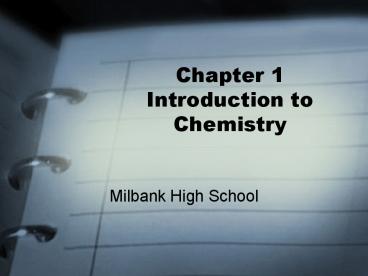Chapter 1 Introduction to Chemistry - PowerPoint PPT Presentation
1 / 29
Title:
Chapter 1 Introduction to Chemistry
Description:
Analytical Chemistry- concerned with the composition of substances. ... Human Genome Project. bacteria producing insulin. cloning. Chemistry Far and Wide ... – PowerPoint PPT presentation
Number of Views:39
Avg rating:3.0/5.0
Title: Chapter 1 Introduction to Chemistry
1
Chapter 1Introduction to Chemistry
- Milbank High School
2
Section 1.1Chemistry
- OBJECTIVES
- Define chemistry and differentiate among its
traditional divisions.
3
Section 1.1Chemistry
- OBJECTIVES
- List several reasons to study chemistry.
4
What is Chemistry?
- The study of matter, its composition,
properties, and the changes it undergoes.
Everyday life? - Applied Chemistry- is using chemistry to attain
certain goals, in fields like medicine,
agriculture, and manufacturing - Pure chemistry- gathers knowledge for the sake of
knowledge
5
5 Major Areas of Chemistry
- Analytical Chemistry- concerned with the
composition of substances. - Inorganic Chemistry- primarily deals with
substances without carbon - Organic Chemistry- essentially all substances
containing carbon - Biochemistry- Chemistry of living things
- Physical Chemistry- describes the behavior of
chemicals (ex. stretching)
6
Chemistry is
- central to modern science, and to almost all
human endeavors. - important to all sciences - biology, geology,
physics, engineers, etc. - a natural science.
- a language with its own vocabulary.
- a way of thinking.
7
Why Study Chemistry?
- everyone and everything around us involves
chemistry - What in the world isnt Chemistry?
- helps you make choices
- possible career for your future
- used to attain a specific goal
- Do you remember pure and applied chemistry?
8
Section 1.2Chemistry Far and Wide
- OBJECTIVES
- Summarize ways in which chemistry affects your
daily life.
9
Section 1.2Chemistry Far and Wide
- OBJECTIVES
- Describe the impact of chemistry on various
fields of science.
10
Chemistry Far and Wide
- Materials- perfume, steel, ceramics, plastics,
rubber, paints, nonstick cooking utensils,
polyester fibers - Energy- greater demands
- conserve it, or produce more
- fossil fuels, solar, batteries, nuclear (dont
forget pollution!)
11
Chemistry Far and Wide
- Medicine and Biotechnology-
- vitamin C, penicillin, aspirin
- materials for artery transplants and hipbones
- Human Genome Project
- bacteria producing insulin
- cloning
12
Chemistry Far and Wide
- Agriculture- worlds food supply
- plant growth hormones
- ways to protect crops
- disease resistant plants
- The Environment- both risks and benefits involved
in discoveries - carbon dioxide, ozone, warming
13
Chemistry Far and Wide
- Astronomy and Space Exploration-
- composition of the planets
- analyze moon rocks
- planet atmospheres
- life on other planets?
14
Section 1.3Thinking Like a Scientist
- OBJECTIVES
- Describe the steps involved in the scientific
method.
15
Section 1.3Thinking Like a Scientist
- OBJECTIVES
- Distinguish between a theory and a scientific law.
16
The Scientific Method
- A logical approach to solving problems or
answering questions. - Starts with observation- noting and recording
facts - hypothesis- an educated guess as to the cause of
the problem, or a proposed explanation
17
Scientific Method
- controlled experiment- designed to test the
hypothesis - only two possible answers
- hypothesis is right
- hypothesis is wrong
- Generates data observations from experiments.
- Modify hypothesis - repeat the cycle
18
- Cycle repeats many times.
- The hypothesis gets more and more certain.
- Becomes a theory
- A thoroughly tested model that explains why
things behave a certain way.
Observations
Hypothesis
Experiment
19
- Theory can never be proven- due to new
information - Useful because they predict behavior
- Help us form mental pictures of processes (models)
Observations
Hypothesis
Experiment
20
- Another outcome is that certain behavior is
repeated many times - Scientific Law is developed (math?)
- Describes how things behave
- Law- tells how
- Theory- tells why
Observations
Hypothesis
Experiment
21
Observations
Hypothesis
Experiment
22
Section 1.4How to Study Chemistry
- OBJECTIVES
- Explain why learning chemistry requires daily
effort.
23
Section 1.4How to Study Chemistry
- OBJECTIVES
- Describe the importance of writing in the study
of chemistry.
24
How to Study Chemistry
- Understanding and Applying Concepts
- requires effort on your part
- read materials carefully
- take thorough notes you can use
- study often and effectively
- quiet, well-lit, remove distractions
25
How to Study Chemistry
- Understanding and Applying Concepts
- chemistry has a language of its own, so learn
the vocabulary - look around you, and make the connection to the
level of atoms and molecules
26
How to Study Chemistry
- Using Your Textbook
- name chemical compounds
- write chemical formulas
- interpret graphs
- techniques to solve problems
- Use your Teacher and Textbook!
27
How to Study Chemistry
- Using Your Textbook
- take good notes
- solve Practice Problems
- read, keeping objectives in mind
- Student Study Guide (p. 24)
- section summaries Key Terms
28
How to Study Chemistry
- On Your Own
- go beyond the textbook
- make flashcards
- reread and rewrite notes
- quiz yourself and classmates
- form a study group
- ASK, ASK, and ASK
29
How to Study Chemistry
- Tests and Quizzes
- cramming never a good idea
- set aside a certain amount of time every day
- get enough rest daily nutrition
- read tests carefully / thoroughly
- do easy problems first
- show work, and evaluate answer































